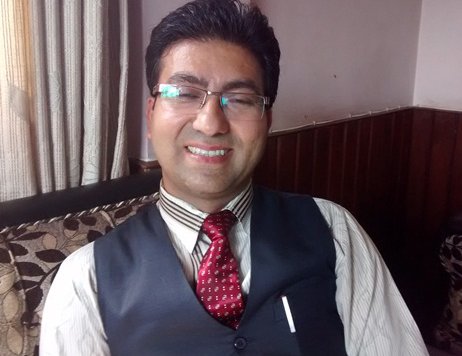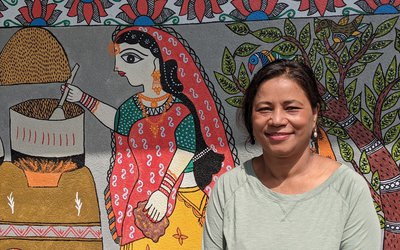
How do you see the current grading system of School Leaving Certificate (SLC)? Is it like that of US, UK, Australia and India?
GPA and grading system are very technical. Only those who have been teaching for long can understand it. The current decision taken by SLC board is very much influenced by personal whims. It has nothing to do with the technical expertise. This is purely a political decision. Our students secure A+, A, B+, B, C and D. Nobody knows on what standards the grades are given. Is it Nepal’s standard for Nepal only or is it of the European standard or is it like the grading system of certain provinces of India. It will create a lot of problems in the future. How other countries around the world are going to recognize our grading system? How will they rate our grades is very important. The Ministry of Education implemented the grading system without studying the system of other countries. This system has already spoiled the future of half a million students.
How about the students securing the highest marks?
For those students who secured A+, A or B+ and B, other universities around the world may recognize them. However, nobody knows how students having secured C and D and below it will fare. Even the students who secured D have to face many hurdles within the country. There are over 100,000 students who secured D or below. The students, who secured D or below are automatically given the certificate of pass but are unfit to pursue higher education in their subject of choice.
Will they be admitted for further studies?
Even the notice issued by Higher Secondary School Board bars these students from pursuing the higher education on their choice. Although technically, all the students are given pass percentage, they are not given that status for real. According to the circular of Higher Secondary School Board, the students who secured the GPA 1.5 or below are allowed to join class eleven, taking Nepali, Sanskrit, Maithali, French, Dance, music, art or local languages as their majors. These subjects have no future and no market. They even cannot allow students to take social studies. The future of such students is very bad. The students need to carry the one page long criteria to seek admission.
After passing the new education bill, which changes the entire education structure with no School Leaving Certificate Examination, how do you see the future of 10+2 education institutions?
Following the passing of the new bill, the SLC will be now taken as a regional level examination. There was no need to change the marking pattern of SLC for this year only. Grading system will create many problems in future. This batch of students will have to face many problems not only in their university life but also in the career in future. There are more than eight hundred higher secondary schools registered with the Higher Secondary School Board, with huge investment. The recent act does not speak anything about these schools. Private sector’s investment is now certain.
Have you not discussed this with the government?
During our negotiations, the government officials expressed their concern on our investment and agreed to protect it, particularly the school with 10+2. The government needs to provide alternative school. There is an investment of over billions of rupees and there are large numbers of experts. These schools are preventing Nepalese students from going abroad for further study and private sector and providing quality education. Private sector are supporting the state to impart the quality education. However, the government always treats us in a bad manner, ignoring our contribution to the state. This is not good.
This is a period of transition in the education sector. How do you manage this transition?
Nepal's education system is in a mess. We are changing our entire system without making any preparations and without adequate infrastructures. There is the need to change the system to meet the global standards. There should have been 1-8 and 9-12 system. There are many such formats, where students have to go now. After completing 1-8, students may want to choose 9-12 in various subjects like law, science, management and humanities. There is a view that the 10+2 should not be allowed. This is wrong. Since the schools cannot afford teachers for 11 and 12, it can make a lot of difference to the present high schools. There is the need to have specialized teachers. The present grading system will create more problems in transition. The present grading is not a continuous grading but just a grading on the basis of the marks students received in the final exam.
Such a large number of students reportedly secured the pass mark, where will these students go for admission. Are there adequate colleges for the students?
There is a problem. So far as the students seeking admission in the science and management faculty are concerned, the number will remain more or less the same. In the past, a student who secured first division was eligible to join science. However, the current circular of HSEB says the students who secured even A in general but secured lower grade in the math are not eligible to study science. There will be more pressure in education and humanities. Even there is a bar to admit in humanities. Had the students failed and allowed them to re-exam, it would have been good. What is the sense to allow the students in the subject which are not sellable in the market.
How can the situation be corrected?
In my opinion, we need to allow the students to choose subjects. We should not impose on the students anymore. This criteria issued by HSEB should be withdrawn. The HSEB should issue the threshold.
- TANAHU HYDROPOWER PROEJCT: A Significant Achievement
- Apr 15, 2024
- AMBASSADOR HANAN GODAR: Sharing Pain With A Nepali Family
- Mar 30, 2024
- VISIT OF KfW AND EIB TO NEPAL : Mission Matters
- Mar 25, 2024
- NEPAL BRITAIN SOCIETY: Pratima Pande's Leadership
- Mar 24, 2024
- NEPAL ARMY DAY: Time To Recall Glory
- Mar 15, 2024
















